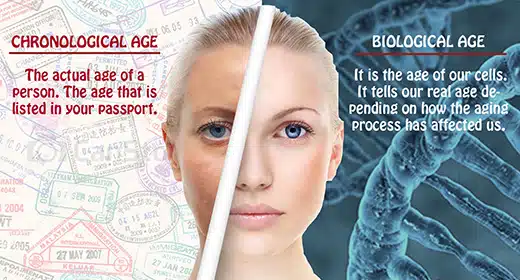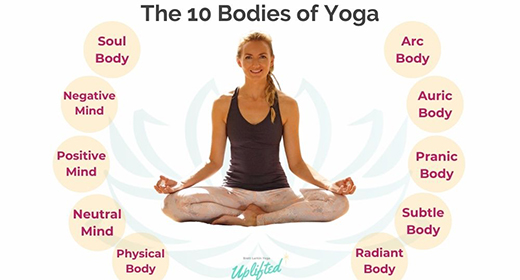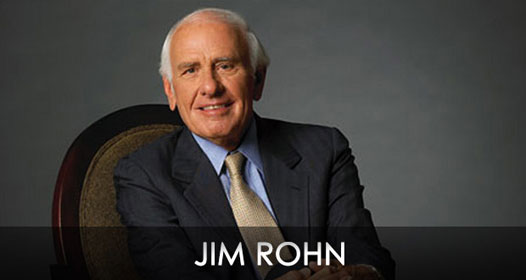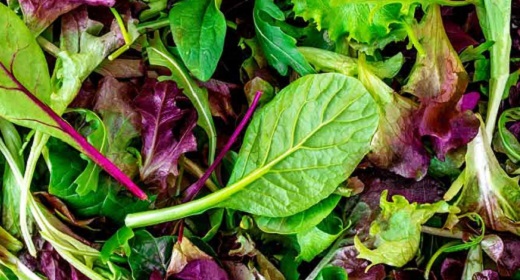by Dr. Alexis Shields: “My body always has aches and pains. Is that just normal for my age?”
 This is a question many of my clients ask me, particularly when we first get started working together.
This is a question many of my clients ask me, particularly when we first get started working together.
And while being in pain is never normal, it is certainly common.
For many people, the concept of aging is synonymous with getting sick and being in pain.
However, it doesn’t have to be that way.
There are a few key areas that contribute to rapid aging and increased risk for chronic disease risk as you age. If you tend to your health over time, you can reverse the signs of aging in your body and feel younger and more healthy than you ever did earlier in life.
If you are interested in slowing down the effects of aging then you are likely interested in increasing your longevity, and to do that, it’s extremely helpful to understand the difference between your chronological age and your biological age.
Before we go any further, let’s quickly define a couple of key terms:
- Longevity: survival to an old age
- Lifespan: total years lived
- Healthspan: years lived in good health
- Chronological age: the number of years you have been alive
- Biological age: how old your cells appear to be based on their current condition
Longevity simply means that you live to a nice old age. However, it defeats the purpose of living longer if those years are spent sick and in pain.
When you increase your longevity, it’s also important to focus on ways to increase your healthspan, so that you maximize your quality of life.
We now have very effective ways to monitor the speed that our bodies age throughout our lives so that we can make changes to our diet and lifestyle that quite literally turn back the hands of time.
What Is Biological Age?
The goal of calculating your biological age is to measure the speed at which your body is aging so that you can determine how your current diet and lifestyle choices are impacting healthy aging.
Your biological age indicates how much aging and damage has occurred inside your body over the course of your lifetime. The biological age calculations are accurate predictors of your healthspan and lifespan.
It might sound obvious, but aging is the leading risk factor for disease.
And while you can’t do anything about the number of years you’ve lived on this planet, you canimprove your biological age (reduce the damage in your cells) over time by making changes to your diet and lifestyle.
Ideally, your biological age would end up being lower than your actual age (though it’s still a great sign if the two numbers just match).
If the numbers match, it means that your body is aging appropriately. If your biological age is less than your actual age, it means that your body is aging more slowly than what is typical for your age.
If your biological age is higher than your actual age, it may mean that there’s been a lot of damage to your cells and your body is aging more rapidly than someone of your actual age.
How Is Biological Age Calculated?
There are several different aging calculators that have been developed using the results from a basic blood test. The most well-researched is PhenoAge developed by Dr. Steven Horvath and his team based on the epigenetic clock theory of aging.
The goal of PhenoAge is to use a basic blood test to predict aging and methylation. This is a core piece of information when I’m doing a blood assessment with clients.
What is methylation?
The simple answer is that methylation is like rust on a pipe. What rust does to metal, methylation does to your cells.
To give you the more technical answer, we’ll need to zoom out a couple of steps, to understand how your genetics affect the age of your cells.
Genetics is the study of DNA. Your DNA is your personalized string of code that produces all the cells in your body. Epigenetics is the study of the changes to your DNA and how this affects your body and health.
Epigenetics controls which parts of your DNA code are turned on or off.
Epigenetic changes can be triggered by many things, the majority of which are lifestyle factors (which we’ll talk about more in a moment).
Epigenetic modifications are chemical changes that occur to the DNA code contained within your cells as you age. The changes are called methylation.
Increased amounts of methylation disrupt the normal function of the cell so that it can’t efficiently do the job it’s designed for. This decline in efficiency is the underlying cause of what we think of as the signs of aging: changes to hair color, the appearance of wrinkles, increased joint pain, and so on.
One quick and easy option for calculating the speed that your body is aging is to plug your blood test values into the Aging.AI calculator, created by Insilico Medicine.
As with many of the most important tests for tracking your health data, you’ll need to have a blood test to calculate your biological age.
If you need a blood test and you are located in the US, you can visit Ulta Labs to order your own.
To calculate your age using Aging.Ai you need to order the following tests:
- Complete Blood Count (CBC) with Differential and Platelets Blood Test
- Comprehensive metabolic panel (CMP)
- Lipid panel
If you would like me to run your data through the biological age calculator that I use with my clients, which includes a custom-made plan to help you improve your longevity and healthspan, click here to book a Mini Health Review.
How to Improve Your Biological Age
Once you have completed your biological age calculation, you’ll have a good sense of whether your health strategies are working, or if you need to start changing your approach to your health and wellbeing.
However, you don’t have to wait for the results to start making meaningful changes. Here are some practical tips you can start implementing today that will improve your biological age, even if you haven’t got the results back yet.
- Intermittent fasting (6:18 or 4:20) or regular periods of caloric restriction (this improves autophagy, which is a process of cellular clean-up that can prevent abnormal cell behavior)
- Regular daily movement and exercise (even just 15 or 20 minutes a day can make a significant difference)
- Heat therapy, such as using the sauna
Another important factor in improving your biological age is reducing your exposure to radiation and environmental toxins. That seems like a huge and very general piece of advice, so let’s break it down.
How to reduce your exposure to EMF Radiation:
- Keep phones and laptops off your body: men, don’t wear in your pocket unless you want to blast your testicles; women, DO NOT tuck it in your bra strap
- When you talk on the phone use the speaker or headphones instead of holding the phone up to your ear
- Put your home WIFI on a timer so that it shuts off during sleeping hours and comes back on in the morning
- Set your cell phone to flight mode at night and keep it away from your bed
- Avoid wearing electronics to bed (such as your Apple Watch). The one exception is the Oura ring as the company has figured out how to maintain very low EMF exposure.
- Avoid using microwaves whenever possible
How to reduce your exposure to environmental toxins:
- Don’t smoke. Cigarettes, cigars, and e-cigarettes are a major source of environmental toxin exposure.
- Read the labels of all your body and skincare products, including toothpaste. You should recognize them all. Get rid of industrial chemicals whenever possible and use this website to find safe products.
- Avoid perfume and cologne unless it’s made from natural essential oils.
- Do not use artificial fragrances in your home. Avoid plug-in scents in the home and car; use candles made with essential oils or essential oil diffusers instead.
- Use natural house cleaning solutions
- It’s a commonly held belief that certain indoor plants filter the air. Sadly, many researchers don’t support this idea. However, plants still lift the mood so I’m very much pro-plant, as well as maintaining proper ventilation from opening doors and windows which likely does much more for removing toxins from your home.
One other major factor in your biological age is your stress level.
Chronic stress accelerates premature aging. Stress shortens your DNA telomeres (the protective caps on the ends of our DNA that protect the DNA information from being damaged). This also increases methylation and increases your risk for a compromised immune system and many chronic diseases.
Some common sources of chronic stress include…
- A demanding or unbalanced work situation
- High-conflict personal relationships
- Time spent on social media
- Time spent consuming news media
- Caring for a loved one with a physical or mental illness or injury
While these are not necessarily easy issues to quickly change, just becoming aware of them can help you start to put strategies in place to reduce their impact on your health and wellbeing
And don’t forget that there’s another type of stress that’s actually beneficial to the body.
While chronic stress is persistent and negative (‘distress’), short periods of positive stress (‘eustress’) such as exercise, fasting, and exposure to cold or heat, help to create better stress adaptation mechanisms in the body. In turn, this improved stress management can have a positive impact on your biological age and can lead to decreased aging.
Calculating your biological age gives you a powerful snapshot of your current health.
While it’s a fairly new data point to be able to track, it gives us a very clear metric to work with when we start implementing new wellness strategies, and I encourage you to add this number to the other data you are tracking related to your health.









































